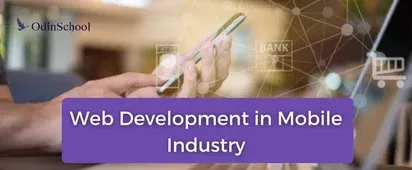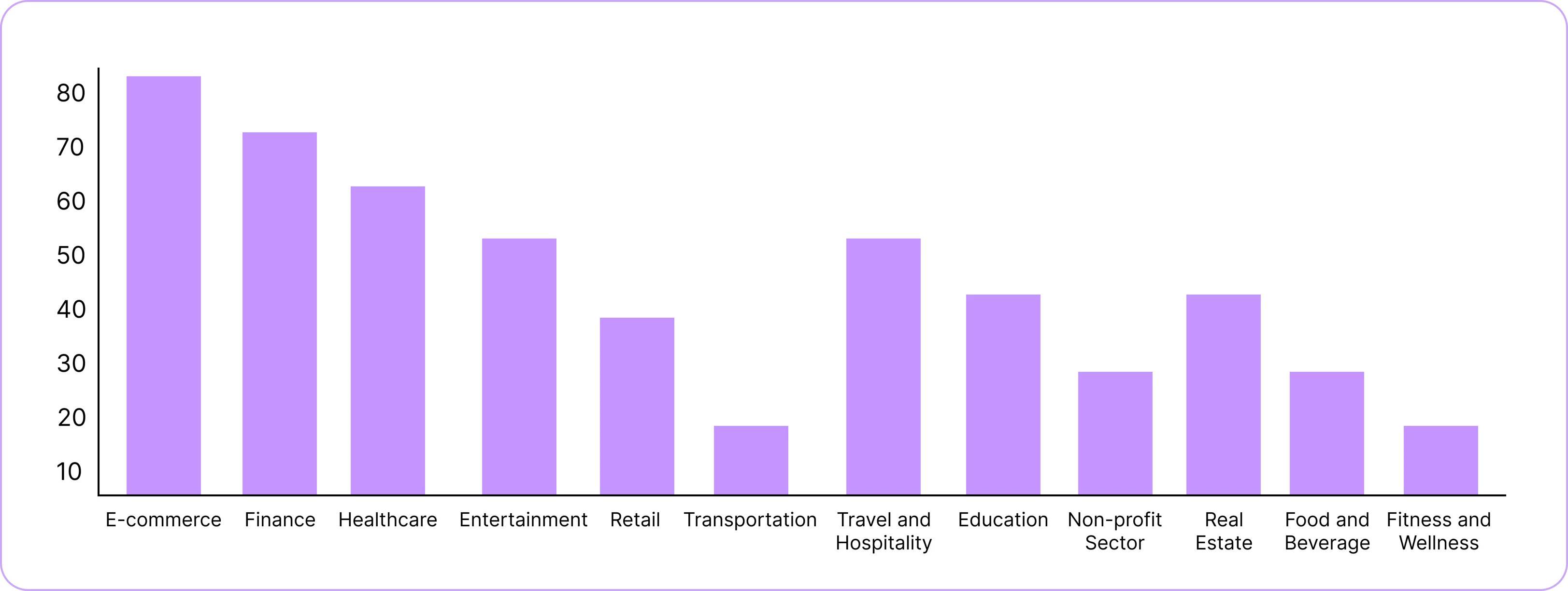Unlocking Web Development Opportunities in the Mobile Market

The number of smartphone subscriptions globally is currently over 6 billion and is projected to reach over 7.6 billion by 2027.
This one statistic speaks volumes about the phenomenal rise of the mobile market. This technology has made significant strides in recent years, enabling a wide range of functions, from communication and work to entertainment and e-commerce. As a result, the mobile market is fast growing and offering new options to consumers, organizations, and developers.
Since 2015, the demand for web developers has increased by 35% annually. By 2024, the US Bureau of Labor Statistics predicts that there will be 853,000 more jobs available for these experts.
‘WHY’ The Demand for Web Development Skills in Mobile Market
The demand for web development skills in the mobile market is skyrocketing as businesses strive to deliver comprehensive and feature-rich mobile applications.
Web developers are highly sought after for their ability to handle the entire development process. Their proficiency in mobile technologies, frameworks, and programming languages enables them to create seamless user experiences across platforms.
Exploring Web Development in the Mobile Market
In the world of mobile app development, web development is akin to being a technological wizard who can weave together the magic of front and backend development.
On the front, these developers are like artists, painting a beautiful canvas that users interact with. They utilise their knowledge of HTML, CSS, and JavaScript to breathe life into the app's UI, ensuring it is visually stunning, intuitive, and seamlessly responsive across different devices and screen sizes.
But wait, there's more! They also possess the backend wizardry to conjure up the complex infrastructure that makes the app tick. They work their magic with server-side languages such as Node.js, Python, or Ruby, leveraging powerful frameworks like Express.js, Flask, or Ruby on Rails. They architect and develop robust APIs, skillfully manage databases, and integrate various third-party services, all to ensure a seamless and secure user experience.
{% module_block module "widget_1d5b7a50-dc29-436d-8a68-ea23ac256624" %}{% module_attribute "child_css" is_json="true" %}{% raw %}{}{% endraw %}{% end_module_attribute %}{% module_attribute "css" is_json="true" %}{% raw %}{}{% endraw %}{% end_module_attribute %}{% module_attribute "definition_id" is_json="true" %}{% raw %}null{% endraw %}{% end_module_attribute %}{% module_attribute "field_types" is_json="true" %}{% raw %}{"image_desktop":"image","image_link":"link","image_mobile":"image"}{% endraw %}{% end_module_attribute %}{% module_attribute "image_desktop" is_json="true" %}{% raw %}{"alt":"Mobile-version-of-blog-ads-_4_","height":300,"loading":"lazy","max_height":300,"max_width":1200,"size_type":"auto","src":"https://odinschool-20029733.hs-sites.com/hubfs/Mobile-version-of-blog-ads-_4_.webp","width":1200}{% endraw %}{% end_module_attribute %}{% module_attribute "image_link" is_json="true" %}{% raw %}{"no_follow":false,"open_in_new_tab":true,"rel":"noopener","sponsored":false,"url":{"content_id":null,"href":"https://www.odinschool.com/web-developer-bootcamp","type":"EXTERNAL"},"user_generated_content":false}{% endraw %}{% end_module_attribute %}{% module_attribute "image_mobile" is_json="true" %}{% raw %}{"alt":"Blog Listing Ad (2)-2","height":300,"loading":"lazy","max_height":300,"max_width":500,"size_type":"auto","src":"https://odinschool-20029733.hs-sites.com/hubfs/Blog%20Listing%20Ad%20(2)-2.webp","width":500}{% endraw %}{% end_module_attribute %}{% module_attribute "label" is_json="true" %}{% raw %}null{% endraw %}{% end_module_attribute %}{% module_attribute "module_id" is_json="true" %}{% raw %}132581904694{% endraw %}{% end_module_attribute %}{% module_attribute "path" is_json="true" %}{% raw %}"/OdinSchool_V3/modules/Blog/Blog Responsive Image"{% endraw %}{% end_module_attribute %}{% module_attribute "schema_version" is_json="true" %}{% raw %}2{% endraw %}{% end_module_attribute %}{% module_attribute "smart_objects" is_json="true" %}{% raw %}null{% endraw %}{% end_module_attribute %}{% module_attribute "smart_type" is_json="true" %}{% raw %}"NOT_SMART"{% endraw %}{% end_module_attribute %}{% module_attribute "tag" is_json="true" %}{% raw %}"module"{% endraw %}{% end_module_attribute %}{% module_attribute "type" is_json="true" %}{% raw %}"module"{% endraw %}{% end_module_attribute %}{% module_attribute "wrap_field_tag" is_json="true" %}{% raw %}"div"{% endraw %}{% end_module_attribute %}{% end_module_block %}
Emerging Technologies in Web Development for Mobile
In the fast-paced world of web mobile development, staying updated with the latest technologies and frameworks is crucial. Here are the top cutting-edge technologies and frameworks that are currently relevant in the field
React Native
-
React Native is a cross-platform framework that is not just for creating mobile frontends. To create mobile apps, it can also be used in conjunction with backend technologies like Node.js.
-
While Node.js, along with frameworks like Express.js, can be used to construct the server-side functionality and APIs, React Native can handle the frontend mobile app development.
Flutter
-
Similar to React Native, Flutter is not limited to mobile frontend development. It can be employed for developing mobile applications by integrating it with backend technologies such as Node.js or Python frameworks like Django or Flask.
GraphQL
-
GraphQL is a query language and specification for APIs, making it applicable to both frontend and backend development.
-
On the frontend, GraphQL can be used to query data from the server and efficiently manage data fetching and manipulation.
-
On the backend, GraphQL can be used to define and implement APIs, allowing clients to request specific data structures.
Swift
-
The programming language used to create apps for iOS and macOS is called Swift. Its secure, quick, and expressive design enables developers to create effective and powerful mobile applications.
-
Swift is a crucial technology for frontend-mobile development in the iOS ecosystem because of Apple's strong support and constant advancement.
Firebase
-
Firebase is a comprehensive mobile development platform provided by Google. It offers a suite of services, including authentication, real-time database, cloud storage, push notifications, and hosting.
-
Firebase also facilitates the development of backend functionalities and provides seamless integration with frontend technologies, making it valuable for front-end mobile development.
These technologies empower developers to create feature-rich, performant, and cross-platform mobile applications while enabling seamless collaboration between frontend and backend development teams.
Industry Applications of Front-end Mobile Development

Front-end mobile development is a versatile skill set that benefits a wide range of industries and sectors. Here are some diverse industries that greatly benefit from front-end mobile development:
E-commerce
-
Front-end mobile development plays a crucial role in building and enhancing e-commerce platforms.
-
Developers can create user-friendly interfaces, implement secure payment gateways, integrate inventory management systems, and optimise the overall shopping experience for mobile users.
Fintech
-
The financial technology industry heavily relies on mobile apps for banking, payments, investment, and financial management.
-
Web developers contribute to building secure and robust mobile applications that handle sensitive financial data, integrate with banking APIs, and provide seamless user experiences.
Healthtech
-
Mobile apps are transforming the healthcare industry, enabling remote consultations, tracking health metrics, and facilitating medication management.
-
Web developers contribute to the development of mobile apps that ensure data privacy, connect with wearable devices, and provide real-time health monitoring capabilities.
Travel and Hospitality
-
The travel and hospitality industry benefits from front-end mobile development for building travel booking apps, hotel reservation systems, and tourism guides.
-
Developers can integrate location-based services, implement secure payment processing, and provide personalised travel recommendations for mobile users.
Education Technology
-
Front-end mobile development plays a crucial role in the education sector, enabling e-learning platforms, mobile learning apps, and virtual classrooms.
-
Developers can create interactive learning interfaces, integrate multimedia content, and build collaboration tools for students and teachers.
Entertainment and Media
-
Mobile apps for entertainment and media, such as streaming platforms, gaming apps, and social media applications, heavily rely on front-end development.
-
Developers can create engaging user interfaces, implement real-time updates, and integrate social sharing features to enhance the user experience.
Transportation and Logistics
-
The transportation and logistics industry benefits from front-end mobile development by building mobile apps for ride-hailing services, package tracking, and fleet management.
-
Developers can create seamless booking interfaces, integrate location tracking and mapping services, and optimise routes and delivery logistics.
Social Impact and Non-profit
-
Front-end mobile development also extends to social impact and non-profit sectors.
-
Developers can contribute to building mobile apps for charitable causes, volunteer management systems, and platforms that connect individuals to social initiatives.
Real Estate
-
The real estate industry leverages mobile apps for property listings, virtual tours, and property management.
-
Web developers can build mobile apps that integrate property databases, provide interactive virtual tours, and enable secure communication between real estate agents and clients.
Food and Beverage
-
Front-end mobile development is essential for the food and beverage industry, where mobile apps are used for food ordering, delivery, and table reservations.
-
Developers can create intuitive interfaces, integrate payment gateways, and incorporate features like menu customization, order tracking, and customer feedback.
Fitness and Wellness
-
Mobile apps have transformed the fitness and wellness sector, providing workout tracking, meal planning, and meditation guidance.
-
Web developers can build mobile apps that connect with wearables, track health metrics, offer personalised fitness plans, and provide a community platform for users to interact and share progress.
These industries showcase the diverse applications of front-end mobile development, highlighting the opportunities for developers to contribute to various sectors and create innovative solutions that cater to specific industry needs.
Final Thoughts
In the ever-evolving mobile market, the opportunities for web developers are boundless. With the increasing demand for mobile apps across various industries, there has never been a better time to pursue a career in front-end development. Joining a professional course in web development can provide aspiring developers with the skills and knowledge needed to thrive in this dynamic field.
A professional web development course offers a structured learning environment where individuals can gain expertise on the latest industry practices. Moreover, a professional course often includes hands-on projects, real-world case studies, and industry-relevant insights, enabling learners to apply their knowledge to practical scenarios.